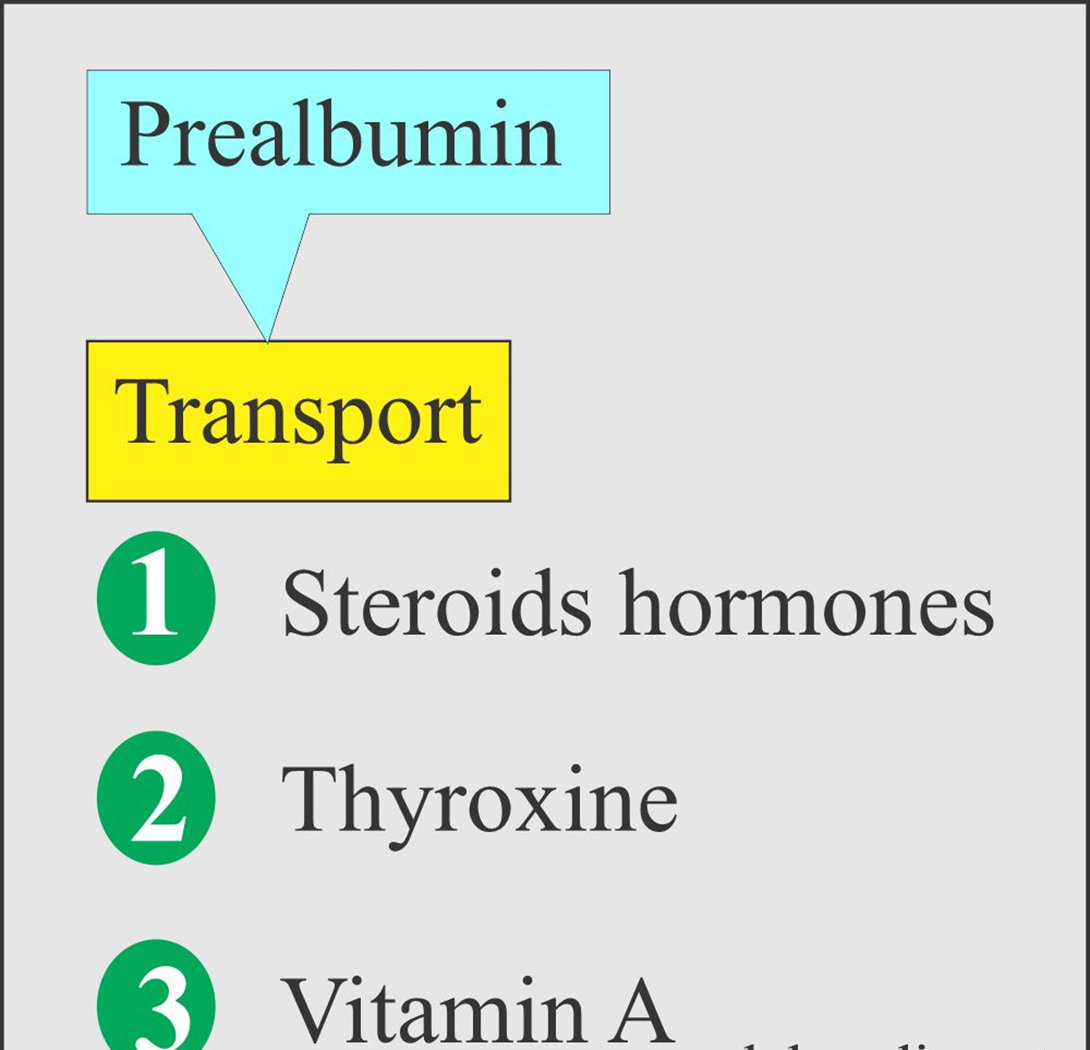A nurse is caring for a client who has a major burn injury and is receiving total parenteral nutrition. Which of the following laboratory tests is the priority for the nurse to use to confirm the client is receiving adequate nutrition?
Prealbumin
Folic acid
Magnesium
Transferrin
The Correct Answer is A
Choice A reason: Prealbumin is a protein that is synthesized by the liver and reflects the current nutritional status of the client. It has a short half-life of 2 to 3 days, which makes it a sensitive indicator of changes in protein intake. Prealbumin levels are decreased in clients who are malnourished or have inflammation, infection, or liver disease. The nurse should monitor the prealbumin levels of the client who is receiving total parenteral nutrition to ensure that they are within the normal range of 15 to 36 mg/dL.
Choice B reason: Folic acid is a water-soluble vitamin that is involved in DNA synthesis, cell division, and red blood cell production. Folic acid levels are decreased in clients who have malabsorption, alcoholism, or certain medications, such as methotrexate or phenytoin. The nurse should assess the folic acid levels of the client who is receiving total parenteral nutrition, but it is not the priority test to confirm adequate nutrition.
Choice C reason: Magnesium is a mineral that is involved in many enzymatic reactions, muscle contraction, nerve transmission, and bone formation. Magnesium levels are decreased in clients who have malnutrition, diarrhea, vomiting, or diuretic use. The nurse should evaluate the magnesium levels of the client who is receiving total parenteral nutrition, but it is not the priority test to confirm adequate nutrition.
Choice D reason: Transferrin is a protein that transports iron in the blood and reflects the iron stores of the client. Transferrin levels are decreased in clients who have iron deficiency anemia, chronic disease, or liver disease. The nurse should check the transferrin levels of the client who is receiving total parenteral nutrition, but it is not the priority test to confirm adequate nutrition.

Nursing Test Bank
Naxlex Comprehensive Predictor Exams
Related Questions
Correct Answer is C
Explanation
Choice A reason: The client should not replace salt with soy sauce, as soy sauce is not kosher. Soy sauce is made from fermented soybeans and wheat, which are not allowed in a kosher diet. The client should use kosher salt or other kosher seasonings instead.
Choice B reason: The client's primary vegetables should not be squash and corn, as they are not considered kosher. Squash and corn are classified as kitniyot, which are legumes, grains, seeds, and other plant products that are not allowed in a kosher diet. The client should eat more leafy greens, root vegetables, and fruits, which are kosher.
Choice C reason: The client can eat meat and nondairy margarine together, as they are both kosher. Nondairy margarine is made from vegetable oils, which are pareve, meaning they are neither meat nor dairy. The client should avoid eating meat and dairy products together, as they are not kosher.
Choice D reason: The client does not need to use their right hand when eating food, as this is not a requirement of a kosher diet. This is a practice of some Muslims, who believe that the right hand is for eating and the left hand is for cleaning. The client should follow the rules of kashrut, which are the Jewish laws of kosher food.
Correct Answer is ["A","C","E"]
Explanation
Choice A reason: Dyspnea is a sign of pulmonary edema, which can occur as a complication of parenteral nutrition due to fluid overload or allergic reaction¹². The nurse should monitor the client's respiratory status and oxygen saturation and report any signs of respiratory distress.
Choice B reason: Parenteral nutrition should not be infused by gravity, as this can cause fluctuations in the infusion rate and lead to hyperglycemia or hypoglycemia¹³. The nurse should use an infusion pump to deliver parenteral nutrition at a constant and controlled rate.
Choice C reason: Parenteral nutrition solution should be administered within 30 min after removing from the refrigerator, as prolonged exposure to room temperature can increase the risk of bacterial contamination and infection¹⁴. The nurse should check the expiration date and inspect the solution for any discoloration, cloudiness, or particulate matter before administration.
Choice D reason: Parenteral nutrition bag and infusion tubing should be changed every 24 hr, not every 72 hr, to prevent the growth of microorganisms and reduce the risk of infection¹⁵. The nurse should use aseptic technique when changing the bag and tubing and follow the facility's protocol for dressing changes and catheter care.
Choice E reason: Parenteral nutrition should be started only after the central venous catheter position is confirmed by radiology, as incorrect placement can cause serious complications such as pneumothorax, hemothorax, or cardiac tamponade¹⁶. The nurse should obtain a chest x-ray and wait for the provider's confirmation before initiating parenteral nutrition.
Whether you are a student looking to ace your exams or a practicing nurse seeking to enhance your expertise , our nursing education contents will empower you with the confidence and competence to make a difference in the lives of patients and become a respected leader in the healthcare field.
Visit Naxlex, invest in your future and unlock endless possibilities with our unparalleled nursing education contents today
Report Wrong Answer on the Current Question
Do you disagree with the answer? If yes, what is your expected answer? Explain.
Kindly be descriptive with the issue you are facing.
